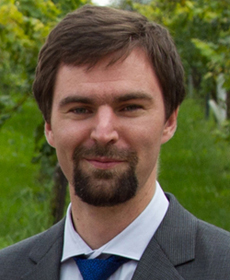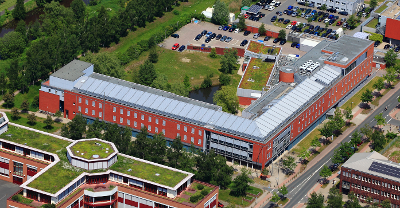← students

| First name: | Richard |
| Last name: | Hahnke |
| Country: | Germany |

Thesis Subject:Cultivation of Flavobacteria and other in situ abundant bacteria from the North Sea
| Education: | |
| 06/2013 - present
post graduate Max Planck Institute for Marine Microbiology Department of Microbiology and Department of Molecular Ecology Bremen |
|
| 10/2010 - 06/2013
Ph.D. student Max Planck Institute for Marine Microbiology Department of Microbiology Bremen Ph.D. thesis: Cultivation of Flavobacteria and other in situ abundant bacteria from the North Sea |
|
| 08/2007- 09/2009
Master student, Molecular Biology Fachhochschule Gelsenkirchen Department of Applied Science Recklinghausen Topic of Master thesis: Untersuchungen zur Struktur und Funktion mikrobieller Populationen des südpazifischen Sediments |
|
| 10/2004 - 07/2007
Bachelor student, Molecular Biology Fachhochschule Gelsenkirchen Department of Applied Science Recklinghausen Topic of Bachelor thesis: T-RFLP Fragmentgrößenbestimmung |
|
| 08/2002 -05/2003
Fachgebundene Hochschulreife (comparable to a university entrance exam) Oberstufenzentrum für Chemie, Biologie, Informatik Berlin-Neukölln |
|
| 08/1999 - 05/2001
Biological-technical assistant Oberstufenzentrum Werder Werder (Havel) |
Scientific Interests and Goals:Flavobacteria are abundant (up to 30%) in the North Sea, a coastal sea on the continental shelf of Europe. However, this abundance was so far not reflected by strains in culture. We isolated Flavobacteria from pelagic and benthic samples from different locations of the North Sea. The new marine agar HaHa and a colony screening by Bacteroidetes 16S rRNA specific PCR led to the cultivation of 375 marine Flavobacteriaceae strains. These strains affiliated to 42 new species in 22 established and 7 new genera, as well as 37 known species in 16 genera. This study demonstrated a good culturability of phylogenetically diverse Flavobacteria from the North Sea on solid medium.
During the decay of a phytoplankton bloom distinct bacterioplankton populations serially succeeded, resulting in the remineralisation of more than half of the net primary production. Based on in situ expressed transporters and glycoside hydrolases it was suggested that algae derived carbohydrates provided a series of ecological niches. However, representative strains in culture were not available to characterize the physiological activities of those bacteria in the oceans. I isolated pelagic bacteria from the seawater of the island Helgoland in the German Bight during a phytoplankton bloom in spring 2010. Aerobic dilution cultivation of one nanolitre seawater on the new marine medium HaHa led to an exceptional high culturability of 35% the isolation of 19 pure cultures. Mapping of metagenomic reads of functional genes to the genomes of my Formosa, Polaribacter (Flavobacteriaceae) and Reinekea (Gammaproteobacteria) strains revealed an affiliation to the same species which had high abundances of 5-25% during the phytoplankton bloom senescence in spring 2009.
Genome analysis of Flavobacteriaceae strains in combination with the metaproteome of the spring phytoplancton bloom 2009 yielded numerous carbohydrate active enzymes (CAZymes) and polysaccharide utilization loci (PUL) of which many where expressed in situ. In parallel, physiological characteristics and the growth on different mono- and polysaccharides provided further evidence that Formosa, Polaribacter and Reinekea species could prevail in different ecological niches during algae decay.
During the decay of a phytoplankton bloom distinct bacterioplankton populations serially succeeded, resulting in the remineralisation of more than half of the net primary production. Based on in situ expressed transporters and glycoside hydrolases it was suggested that algae derived carbohydrates provided a series of ecological niches. However, representative strains in culture were not available to characterize the physiological activities of those bacteria in the oceans. I isolated pelagic bacteria from the seawater of the island Helgoland in the German Bight during a phytoplankton bloom in spring 2010. Aerobic dilution cultivation of one nanolitre seawater on the new marine medium HaHa led to an exceptional high culturability of 35% the isolation of 19 pure cultures. Mapping of metagenomic reads of functional genes to the genomes of my Formosa, Polaribacter (Flavobacteriaceae) and Reinekea (Gammaproteobacteria) strains revealed an affiliation to the same species which had high abundances of 5-25% during the phytoplankton bloom senescence in spring 2009.
Genome analysis of Flavobacteriaceae strains in combination with the metaproteome of the spring phytoplancton bloom 2009 yielded numerous carbohydrate active enzymes (CAZymes) and polysaccharide utilization loci (PUL) of which many where expressed in situ. In parallel, physiological characteristics and the growth on different mono- and polysaccharides provided further evidence that Formosa, Polaribacter and Reinekea species could prevail in different ecological niches during algae decay.
Selected Publications:Variations of pelagic bacterial communities in the North Atlantic Ocean coincide with water masses (2013). R. L. Hahnke, C. Probian, B.M. Fuchs and J. Harder. Aquatic Microbial Ecology. (under revision)
Phylogenetic diversity of Flavobacteria isolated from the North Sea on solid media (2013). R. L. Hahnke and J. Harder. Systematic and Applied Microbiology. (accepted)
Phylogenetic diversity of Flavobacteria isolated from the North Sea on solid media (2013). R. L. Hahnke and J. Harder. Systematic and Applied Microbiology. (accepted)


